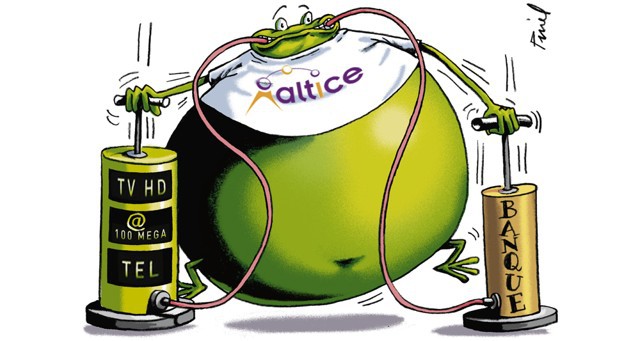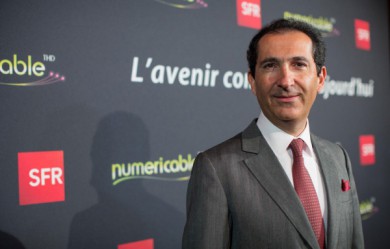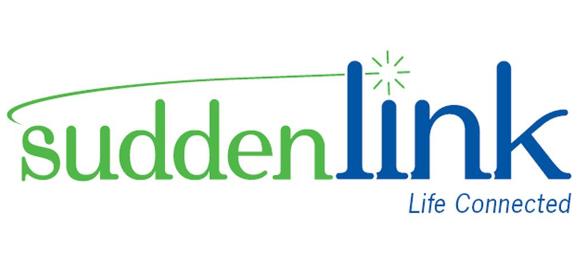
The French press continues to ridicule Patrick Drahi’s debt-laden acquisitions as “Altice in Wonderland.” (Cartoon: Les Echos)
The next owner of Cablevision and Suddenlink put profits ahead of people and managed to drive away more than one million of his own customers in Europe within a year of a massive cost-cutting operation that led to service degradation and noncompetitive prices.
Patrick Drahi’s Altice NV has similar plans in store for both American cable companies if he manages to win regulator approval of the acquisitions.
The Wall Street Journal reports Altice was willing to sacrifice market share if it meant the company could extract cost-savings and higher profits that Drahi could use to help pay off some of his acquisition loans.
Some Wall Street analysts were initially excited to hear Drahi would slash salaries, knock union heads, and eviscerate at least $900 million in costs annually from Cablevision, results likely to boost Cablevision’s share price and fatten investor returns.
The cost-cutting formula is always the same in an Altice takeover. Special teams arrive from Europe within days of a deal closing with strict instructions to cut employees, reduce the salaries of those remaining, and brutally cut costs out of the business. Drahi is famous in Europe for stopping payment on checks to suppliers, leaving them unpaid until they agreed to offer his company discounts up to 40%. Employees also share stories of having to pay for office supplies out-of-pocket and in at least one case, staffed a wireless store that carried no phones in inventory because Drahi stiffed his supplier.

Drahi
The bad news for Wall Street? Customers of Drahi’s cable and wireless companies are fleeing in droves. At least 1.1 million of Altice’s French customers have taken their business elsewhere, fed up with deteriorating service and uncompetitive prices.
One manager lamented that as Altice-owned Numericable-SFR’s wireless network deteriorated to the point of regularly dropping calls, Drahi borrowed nearly $2 billion he set aside in preparation for further acquisitions.
“Debt is Drahi’s drug,” commented French news site LeJDD.
Drahi leverages his buyouts with loans covering up to 80% of the purchase price. Eerily similar to toxic sub-prime mortgage debt, investment banks consider holding too much of Drahi’s debt potentially poisonous, so they routinely repackage it with other loans and resell it to other financial institutions and unknown investors. That has some in the French government concerned Drahi is building the world’s first “too big to fail” telecom company, while leaving investors in the dark about the risks of holding his loans.
The lessons learned watching Drahi manage one of France’s largest wireless operators may concern U.S. regulators contemplating Drahi’s buyout offers of Cablevision and Suddenlink.
 In the first quarter under Drahi, SFR boosted margins by 21% based on ruthless cost cutting. But a stunning 445,000 customers quickly left the operator. Critics contend Drahi’s cost cutting does temporarily boost profits, but also allows network quality to degrade, eventually alienating customers who leave. Drahi then uses SFR’s smaller customer base as an excuse for further cost-cutting. Between 2006-2011, Drahi eliminated half of the wireless provider’s workforce and outsourced much of his call center customer support operations.
In the first quarter under Drahi, SFR boosted margins by 21% based on ruthless cost cutting. But a stunning 445,000 customers quickly left the operator. Critics contend Drahi’s cost cutting does temporarily boost profits, but also allows network quality to degrade, eventually alienating customers who leave. Drahi then uses SFR’s smaller customer base as an excuse for further cost-cutting. Between 2006-2011, Drahi eliminated half of the wireless provider’s workforce and outsourced much of his call center customer support operations.
Those still working at Altice companies after the cost-cutters depart are left in a state of siege.
 “He’s a beast,” one employee told LeJDD in a piece that compared working for SFR with being in hell. All expenses are scrutinized, company-paid travel is canceled, team exercises and company meals are dropped, and for vendors and suppliers things are even worse. All projects are frozen and all outstanding invoice payments are stopped, reviewed one-by-one. Drahi’s goal is to find 600 million euros annually in savings to repay the €13 billion he borrowed to acquire SFR in 2014.
“He’s a beast,” one employee told LeJDD in a piece that compared working for SFR with being in hell. All expenses are scrutinized, company-paid travel is canceled, team exercises and company meals are dropped, and for vendors and suppliers things are even worse. All projects are frozen and all outstanding invoice payments are stopped, reviewed one-by-one. Drahi’s goal is to find 600 million euros annually in savings to repay the €13 billion he borrowed to acquire SFR in 2014.
Employees, even those represented by France’s powerful trade unions, are scared into silence, reports LeJDD.
“Be happy you have a job,” is the standard response one trade unionist routinely receives from what is left of SFR’s management. Drahi doesn’t spare management below him either. Within weeks of Altice’s takeover, the flown-in French cost cutters immediately terminated 55 of the 70 SFR managers earning more than 150,000 euros per year. At least 100 middle managers were also quickly shown the door. IT and networking positions are also deemed ‘bloated’ and a reorganization quickly whittled employees down to a token force. The marketing department? Abandoned. Also dismantled was SFR’s team of innovators, working on next generation network upgrades and technology.
 Call centers that handle customer service requests were “on the verge of suffocation,” reported LeJDD. One small call center operator had to send his attorney to SFR’s offices to threaten them over an outstanding bill of one million euros. Drahi demanded an immediate 35% discount if the attorney wanted to leave with a check in hand.
Call centers that handle customer service requests were “on the verge of suffocation,” reported LeJDD. One small call center operator had to send his attorney to SFR’s offices to threaten them over an outstanding bill of one million euros. Drahi demanded an immediate 35% discount if the attorney wanted to leave with a check in hand.
Cable customers share their own anecdotal stories, including one forced to acquire and supply his own cable to complete an installation because the technician had run out. Another reported a tardy cable installer humbly apologized, claiming he was forced to pay out-of-pocket for fuel to get his stalled cable truck back on the road again.
The horror stories from Europe are making an impact in New York’s financial markets, along with Altice’s improbable formula of profiting from alienating customers. After 18 months of unbridled growth and 47 billion euros in loans to finance multiple acquisitions, Wall Street is getting worried. Altice has lost 50% of its value in just six months and Moody’s has now rated Altice’s debt as “highly speculative,” the last step on the basement stairs right before “default.”
“Drahi carries too much debt,” said the head of a French investment fund. “He and his team have lost all sense of reality.”
 LeJDD put it more colorfully: “The ogre was too greedy.”
LeJDD put it more colorfully: “The ogre was too greedy.”
To placate investors, Drahi is planning to slow future acquisitions, something he may not have had much say in. Bankers forced Drahi to accept considerably higher interest rates to finance his American cable company buyouts.
Numericable-SFR’s long-dead marketing department is also being revived, offering discounts and marketing the service more aggressively to stem customer defections. But the company’s increasingly poor reputation is making that a hard sell in Europe, where fierce competition among multiple providers has fueled a long-lasting price war.
Altice officials point to the fact their severe cost-cutting strategy may have faced greater challenges in Europe, where competition is always a speed bump to high profits. But company officials privately stress their ‘profits first’ formula stands a better chance of success in America, where customers don’t have a lot of choice. Competition is less risky for Suddenlink than it is for Cablevision. Altice promises to wring $215 million annually in savings out of the largely rural and small city provider Suddenlink. But Altice’s estimate of $900 million in savings from Cablevision, which faces formidable competition from Verizon FiOS, seems much less realistic, according to Wall Street analysts.
MoffettNathanson analyst Craig Moffett said Altice was taking cuts to an extreme.
“You’re talking about huge cuts to customer service levels to installation and maintenance costs to marketing and promotions,” Moffett told Reuters. “You can’t expect to be able to make dramatic cuts… without having an impact on the business.”


 Subscribe
Subscribe
I would like to see what happens when he asks Disney for a 40% discount…
How much are those “flown in” French cutters making a year? Plus the expenses incurred to get them here? Talk about slashing costs. Save on the airfare and hotel accommodations for those French cutters and lay people off over the phone. We are beyond acting in a professional mannerism here if profit is the only thing he is concerned about. Be lucky you have a job? What good is having a job if the salary you’re making has been cut and isn’t enough to pay the bills you need to pay? The bills you have been paying and the salary… Read more »